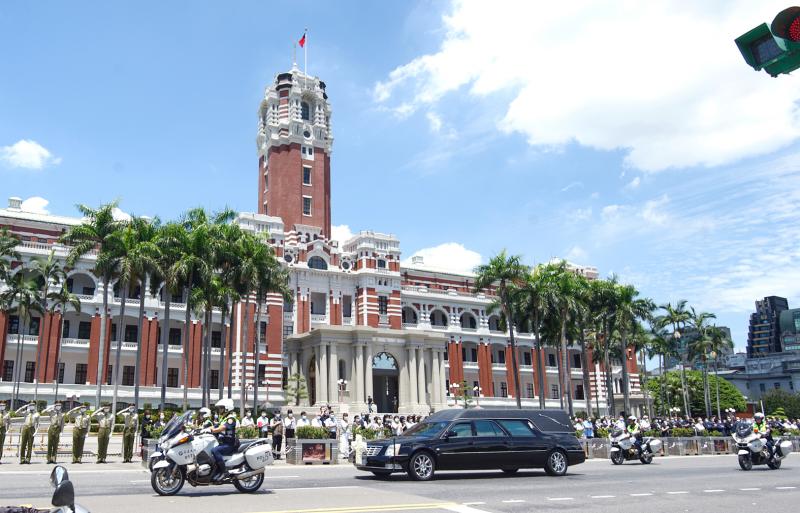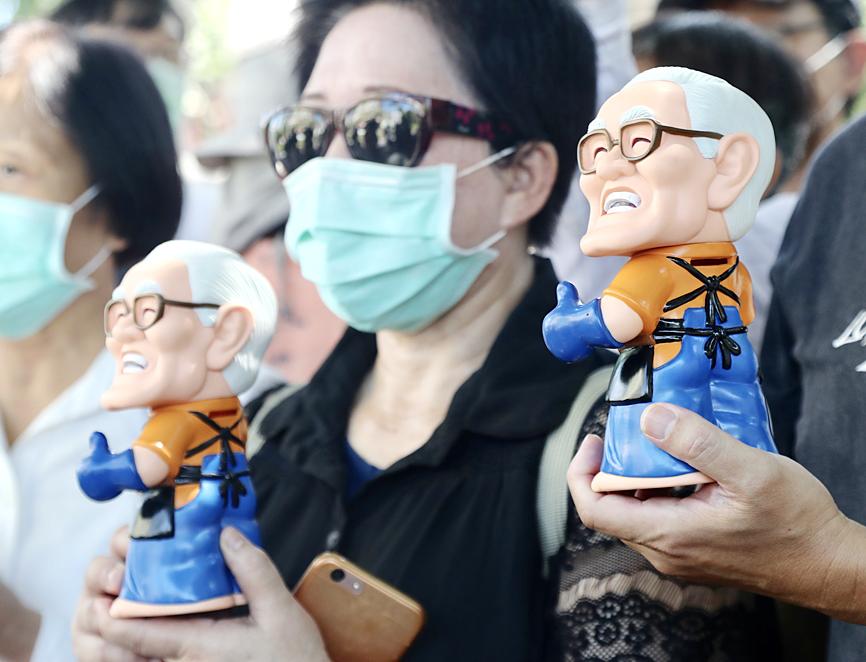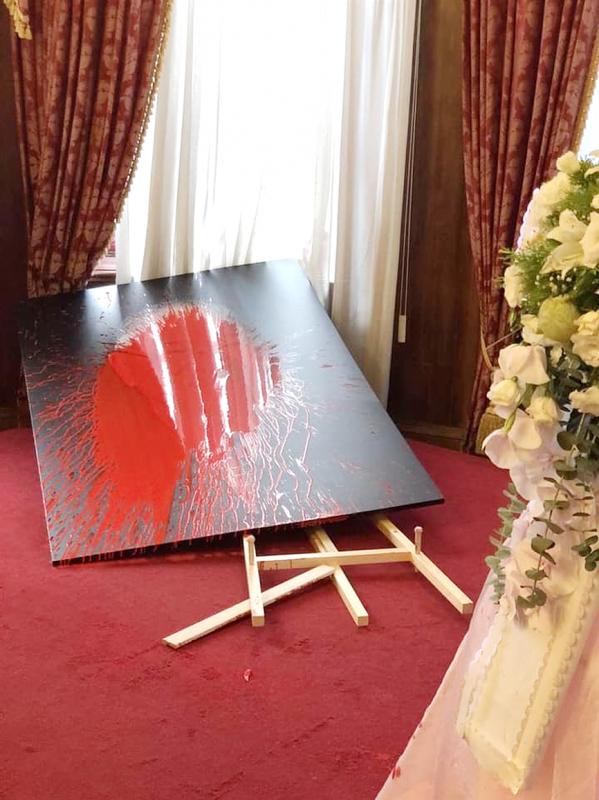Family members and close friends bade farewell to former president Lee Teng-hui (李登輝) at a private funeral service at Taipei’s Che-Lam Presbyterian Church yesterday morning, after which a funeral procession made a symbolic lap around the Presidential Office Building before winding its way to the Taipei City Second Funeral Parlor.
Lee, dubbed “Mr. Democracy” after he ended Taiwan’s autocratic rule in favor of free elections, died on July 30 at the age of 97.
Lee’s body was transported in a hearse, departing from Taipei Veterans General Hospital at 6:38am, where about 300 doctors and nurses lined the road to pay their respects.

Photo: Liu Hsin-de, Taipei Times
“The medical staff came out of their own volition to send off the former president,” said Hwang Shinn-jang (黃信彰), the hospital’s deputy director and spokesman. “They wanted to express their gratitude and regret on the departure of a good friend, especially the medical team who cared for him over the past decade.”
“We believe the former president has become ‘1,000 winds’ that are free across the vast sky to always watch over us and protect Taiwan,” Hwang said, alluding to lyrics from A Thousand Winds (千風之歌), one of Lee’s favorite songs.
At the funeral service, a church bell rang 21 times at 10am.

Photo: CNA
Pastors Yeh Chi-hsiang (葉啟祥) and Huang Chun-sheng (黃春生) presided over the service.
A funeral procession made a symbolic lap around the Presidential Office Building, where Lee held office from 1988 to 2000, during which he became Taiwan’s first president by direct popular vote.
Presidential Office Secretary-General David Lee (李大維) and National Security Council Secretary-General Wellington Koo (顧立雄) headed groups of presidential staff and military officers in front of the building in a guard of honor until the motorcade departed.

Screen grab from iChungLi’s Facebook page
The procession wound through Taipei’s streets without a portrait of Lee or music.
People lining the route watched in a somber, reflective mood. Some waved and shouted: “Thank you, A-hui Peh” or “We love you, A-hui Peh” (阿輝伯, or “Uncle A-hui”).
From the Presidential Office Building, the motorcade traveled along Roosevelt, Sinsheng S and Sinhai roads to the funeral parlor for the cremation of the body.
At shortly before 2pm, Lee Kun-yi (李坤儀), the former president’s granddaughter, departed with an urn containing his ashes to return to the Lee family residence.
A burial is planned for Oct. 7 at the Wuchihshan Military Cemetery in New Taipei City.
Lee Tung-hui’s wife, Tseng Wen-hui (曾文惠), was at the home to receive the urn. She did not attend the rest of the day’s events over concern for her health, sources said.
Meanwhile, veteran entertainer Lisa Cheng (鄭惠中) was arrested at the Taipei Guest House after allegedly throwing a balloon containing red paint on a portrait of Lee Teng-hui.
A memorial to the former president is open to the public at the site, with people leaving messages in his memory.
However, Cheng, who has opposed efforts to remove memorials to Chiang Kai-shek (蔣介石), was arrested immediately after the incident at about 1pm and taken to the Taipei Prosecutors’ Office for questioning.
Prosecutors said that they intend to charge her and have ordered her to remain at home pending the judicial process.
Presidential Office spokesman Xavier Chang (張惇涵) said: “We condemn such irrational, violent acts... Our office urges all people who visit the memorial to respect the wishes of President Lee and his family in a solemn and dignified manner.”
Additional reporting by Huang Hsin-po, Liu Ching-ho, Jason Pan and Reuters

Intelligence agents have recorded 510,000 instances of “controversial information” being spread online by the Chinese Communist Party (CCP) so far this year, the National Security Bureau (NSB) said in a report yesterday, as it warned of artificial intelligence (AI) being employed to generate destabilizing misinformation. The bureau submitted a written report to the Legislative Yuan in preparation for National Security Bureau Director-General Tsai Ming-yen’s (蔡明彥) appearance before the Foreign Affairs and National Defense Committee today. The CCP has been using cognitive warfare to divide Taiwanese society by commenting on controversial issues such as Taiwan Semiconductor Manufacturing Co’s (TSMC, 台積電) investments in the

INVESTIGATION: The case is the latest instance of a DPP figure being implicated in an espionage network accused of allegedly leaking information to Chinese intelligence Democratic Progressive Party (DPP) member Ho Jen-chieh (何仁傑) was detained and held incommunicado yesterday on suspicion of spying for China during his tenure as assistant to then-minister of foreign affairs Joseph Wu (吳釗燮). The Taipei District Prosecutors’ Office said Ho was implicated during its investigation into alleged spying activities by former Presidential Office consultant Wu Shang-yu (吳尚雨). Prosecutors said there is reason to believe Ho breached the National Security Act (國家安全法) by leaking classified Ministry of Foreign Affairs information to Chinese intelligence. Following interrogation, prosecutors petitioned the Taipei District Court to detain Ho, citing concerns over potential collusion or tampering of evidence. The

‘COMPREHENSIVE PLAN’: Lin Chia-lung said that the government was ready to talk about a variety of issues, including investment in and purchases from the US The National Stabilization Fund (NSF) yesterday announced that it would step in to staunch stock market losses for the ninth time in the nation’s history. An NSF board meeting, originally scheduled for Monday next week, was moved to yesterday after stocks plummeted in the wake of US President Donald Trump’s announcement of 32 percent tariffs on Taiwan on Wednesday last week. Board members voted to support the stock market with the NT$500 billion (US$15.15 billion) fund, with injections of funds to begin as soon as today. The NSF in 2000 injected NT$120 billion to stabilize stocks, the most ever. The lowest amount it

NEGOTIATIONS: Taiwan has good relations with Washington and the outlook for the negotiations looks promising, Minister of Economic Affairs J.W. Kuo said Taiwan’s GDP growth this year is expected to decrease by 0.43 to 1.61 percentage points due to the effects of US tariffs, National Development Council (NDC) Minister Paul Liu (劉鏡清) said at a meeting of the legislature’s Economics Committee in Taipei yesterday, citing a preliminary estimate by a private research institution. Taiwan’s economy would be significantly affected by the 32 percent “reciprocal” tariffs slapped by the US, which took effect yesterday, Liu said, adding that GDP growth could fall below 3 percent and potentially even dip below 2 percent to 1.53 percent this year. The council has commissioned another institution